- Home
- Melissa Marr
Rags & Bones Page 9
Rags & Bones Read online
Page 9
“Oh, I’m sorry to hear that. He was … ” Kind of a son-of-a-bitch, really, bossy and short-tempered and a perfectionist, but then, lots of chefs were like that, and he was a chef, even if a very specialized one. “He was something else,” I said at last.
“He left the restaurant to his assistant,” she went on. “None of his kids wanted to get into the family business, and he knew they’d just sell the place, so he gave it to TJ instead. Lord, there was a fuss about that! But it’s all settled down now. Did you know TJ?”
“No, I don’t think so, but that’s funny—I’m a TJ too.” Terrence James Brydon, and even though everyone called me Terry nowadays, to my family I’d always be TJ.
“Small world. Where you living now?”
“Oakland, California.” Even though, on the show, they always put “San Francisco, CA” underneath my name on the screen. Irritated the shit out of me. Some of the best, most innovative cooking is happening in the East Bay, where newer chefs can actually afford to open restaurants—some of them, anyway. I couldn’t afford it, hence my attempt to make money by going on the show, my brush with temporary fame, and all the unpleasantness that followed. And also hence my decision to accept this year’s invitation to the family reunion, because three thousand miles away from my new life seemed like a good place to be.
“California,” she said, and didn’t add the perfunctory “land of fruits and nuts.” For which I was grateful, since I was just the kind of fruit and nut people thought of when they said that. Part of why I’d gotten on the show was because the producers liked the idea of a six-foot-three, former-high-school-football-playing, Southern-food-specializing gay chef. (I’m not even gay—I’m bi, but reality show producers like bisexual contestants only when they’re cute women.) “What brings you back here?” she asked, and seemed genuinely interested.
“Family reunion.” I dredged up a grin. “You can’t get good banana pudding on the West Coast.” The closest I’d come was a gourmet small-batch banana-pudding-flavored ice pop.
“I believe it. Have a good day, now, and come back and see us before you head west.”
“I’ll do my best.” I didn’t tell her I’d walk across the surface of Mercury for another meal at Willard’s. After all, people who lived here could come by anytime they wanted. Barbecue was as everyday here as good burritos are back on the West Coast. I just thanked her and went outside, the bell over the door jingling above me.
I paused for a moment, the heat enfolding me like a monster’s embrace. The air seemed wavy, distorted like flawed glass—like the heat shimmers you see over blacktop. I wiped sweat out of my eyes. Though the idea of my air-conditioned car was tempting, I decided to trudge around back to see the pit. Open-pit barbecuing is an endangered species even in North Carolina, with old restaurants closing down and not many new ones opening, and even though I was sure nothing had changed since my brief stint as a fry cook, I wanted to take a look at the setup while I still could.
Before I made it around the corner, though, I saw something that made me stop dead. A man wearing soot-stained overalls came toward me from behind the restaurant, mopping at his neck and brow with a filthy white cloth.
I stared at him, because he was me. Same mole just below the right eye. Same crooked nose from when it got broken and set not quite right during a game back in high school. He was wearing smudged glasses, and he outweighed me by twenty or thirty pounds (most of it beer belly), but the only other real difference was his greasy flyaway brown hair—and mine had looked the same until I buzzed it short and dyed it blond.
I took a step backward, but he didn’t look a bit surprised at meeting his doppelganger. “Huh,” he said. “Never thought we’d see you around here again.” His accent was thick, far more so than mine, which had mellowed a lot after a few years out of state. My native Californian (ex) boyfriend David used to laugh whenever my dad or brother called and asked for me, because he could barely even understand their hellos.
What do you do when you’re faced with yourself, or at least some version of yourself? David was doing a lit degree in grad school (on his rich parents’ dime), and he told me once that the writer Jorge Luis Borges claimed to have met a younger version of himself in a park, and had a pleasant conversation with his counterpart while sitting on a bench.
But I’m no Borges. And this other Terry—this TJ—wasn’t a younger me, some fry cook unstuck in time, but a me my own age, early twenties, but living another life. Time travel, I could just about comprehend, but this?
I ran, faster than I ever ran in an attempt to score a touchdown or catch a bus. I jumped into my car and tore out of the parking lot, watching myself diminish in the rearview mirror.
By the time I got to the big house, I’d stopped shaking and had convinced myself I’d just seen someone who looked a little like me and freaked out. I blamed days on the road with no company but my own, compounded by the collected stresses of getting a little bit famous, getting a lot drunk, doing stupid things, going from semi-celebrity chef to unemployed, and getting dumped by my boyfriend and kicked out of the house, not to mention the cognitive dissonance of returning home for the first time since I left at eighteen.
I pulled up in front of the big house, next to a dusty station wagon (hers) and a gleaming, pristine black half-ton pickup (his). Before I’d even gotten out of the car, the screen door on the front porch banged open and a stream of nephews and nieces flowed out. I’m a fairly terrible uncle—I could tell you all their names, I think, but not which kid each name belonged to—but I’m not utterly hopeless: I had a bag of gifts for them, with a snow globe containing the Golden Gate Bridge, a collapsible miniature telescope, a little puzzle that had something to do with spherical magnets, and other gimcrackery that would fall apart under their zealous attention, but would delight them in the meantime.
Once I’d distracted the pack with presents, I made my way up the porch, into the embrace of my older brother, Jimmy, who had a farmer’s tan (he’s a contractor), a sloping potbelly, thinning hair, and a grin as wide as the world. He’s a dozen years older than me, because I was a “bonus baby”—in other words, the accidental surprise my parents hadn’t meant to have, though they did their best to never let me suspect it. Jimmy hugged me hard, but not hard enough to crush the inevitable pack of cigarettes tucked into his shirt pocket. His wife, Emily, fluttered in the background, blond and insubstantial, cooing noises of welcome. She looked exactly the same as she had at their wedding (I was a groomsman, sweating like only a twelve-year-old in a borrowed suit can): like a rare and fragile bird, though I knew she was a lot tougher than she seemed.
Before long I was settled in a rocker on the porch beside my brother, each of us holding a beer, looking out across the long fields, the wife and children off somewhere else, and it was like I’d just been here yesterday.
“So why come back this year?” Jimmy said. “We’ve invited you for every reunion, and you always said you were too busy. So, what—sixth time’s the charm?”
I shook my head. “Things back in Oakland just got … weird.”
Jimmy grunted. “My brother, Chef Hollywood.”
I snorted. “Being on TV is a pain in the ass. My boss liked it—a lot of people came into the restaurant when the show started—and he gave me a raise to make sure I wouldn’t leave. But getting recognized on the street is just weird, and having people come into the restaurant, not because they heard the food was good, but because they wanted to get a look at me … ” I shook my head. “And then, I don’t know, some of the attention, maybe it went to my head, got me in a little trouble … ”
One night I’d gotten very drunk—I’m a chef, and we drink, as a rule, but this was orders of magnitude beyond my tolerance, with admirers buying me round after round, and this one guy, maybe twenty years old and adorable, paid me a lot of attention. One thing led to another. My boyfriend, David, found out, and that was it. We were over. The funny thing was, David and I had an open relationship, and were both
known to see people on the side. But we also had rules: check in with your partner before getting intimate with someone new, and always practice safe sex, and … I failed on both counts.
I was so upset I kept on getting drunk, right on through my next shift, and when some asshole at table four started yelling about how overrated I was, how my food looked pretty on TV but tasted like shit, I came wading out of the kitchen and tried to hit him. I was so messed up I didn’t even connect, just knocked the table over and fell on the floor. That spared me an assault and battery charge, but not my job.
I wasn’t sure I wanted to tell Jimmy all that, especially about David dumping me. He knew I wasn’t straight, of course—at this point, everyone with a TV did, but I’d come out to my family when I was seventeen. My parents took it in stride; they live in the very buckle of the Bible Belt, and if pressed I’m sure they’d say they were Christian, but they’d never been churchgoers. My mom sort of suggested that if I liked women too, I might as well just find a nice girl and marry her, nobody’d ever know the difference, but she didn’t press the point. When my brother found out I’d been involved with other men, he just nodded and absorbed it—like the desert absorbing a spoonful of water—and we never spoke of it again. So I just said, “I acted like a real asshole, and pissed off a lot of my friends, got in trouble at work, and it seemed like a good idea to get away for a while, and come home, and try to remember who I really am.”
Jimmy nodded like that made sense. He’s a good brother.
I wasn’t willing to go into my interpersonal breakdowns with him, but maybe he could set my mind at ease about something else—the mysterious pitmaster TJ. Maybe he was some cousin I’d forgotten, which would explain the family resemblance. I said, “I stopped by Willard’s on the way in—”
Jimmy whistled. “That’s a shame, ain’t it? When Junior passed, his kids thought they’d sell the place and make a pile of money, but nobody wanted to buy it. I guess it’s hard to find anybody who wants to get up before dawn to cook pigs every day. I hate seeing the place all closed up, though, the windows broke, and all that graffiti the meth heads scrawled on the walls … End of an era. We can run over to the White Swan later if you want, they do a good barbecue plate, even if it’s not pit-cooked.”
My belly was still full of Willard’s pulled pork, and even after two swigs of beer, I could taste the last residue of the hush puppies in my mouth. Was Jimmy messing with me? For what possible reason? If Willard’s was closed … what did that mean? Was I having a nervous breakdown?
I put my beer down gently. “I, ah … It’s been a long trip. I think I could use a nap.”
Jimmy nodded. “Sure. I don’t know why you had to drive the whole way—you could’ve flown in, rented a car in Raleigh.”
“I just wanted some time to think.” Which was true, though in point of fact, I wasn’t sure I’d had any thoughts worth thinking in those long days on the road. The problem is, no matter how far or fast you drive, you can’t leave yourself behind. And if you can’t feel at home in your own head, where can you?
“We’ve got one of the spare rooms made up for you. You’re lucky—tomorrow night we’re going to have a full house, people staying over, sleeping on every couch and cot and bit of floor, and you’ve got a bed to yourself. We’re gonna have to stack cousins around you like cordwood.” He grinned. “I hope you’re ready to get stared at and whispered about tomorrow. Prodigal son and celebrity all rolled up into one.”
“I can’t wait,” I said.
I’d expected to sleep until dinnertime or so, but when I woke up blinking in that stale room that smelled of mothballs, it was full dark, which that time of year meant it must be past nine p.m. I fumbled for my phone and saw it was closer to two in the morning. I groaned and rolled out of bed, switching on the lamp by the bed. My belly rumbled unpleasantly, and I slipped out, going down the hallway in my socks, past family photographs that had hung on the walls since my grandparents were alive. Jimmy and his wife hadn’t altered the decor much, so it was still all done in Country Cluttered.
I went downstairs, avoiding the creaking step with my ancient instincts, and into the kitchen, where a single light burned above the stove, as always. I poked my head into the fridge, which was absolutely packed with food ready for tomorrow, or prepped to be popped into the oven according to a byzantine schedule devised by the wives. Most of what I’d learned about the logistics of meal prep had come from getting underfoot in Southern kitchens during the holidays, when hordes of women worked with clockwork precision to turn out their respective specialties, all ready to hit the table at the same time: chicken pastry, baked macaroni and cheese, candied yams, fried chicken, collard greens, green bean casserole, black-eyed peas, banana pudding, two dozen kinds of pie …
I didn’t dare disturb that shrine to Southern cookery, so I sat at the table and ate a bowl of kids’ cereal and topped it off with an apple so improbably large and red that there was no way in hell it was organic. After I finished eating I thought for a moment, then scribbled a note to leave on the kitchen table—couldn’t sleep, went for a drive, home by morning—and went outside.
Willard’s was shuttered and graffiti-covered, and when I peered in the shattered windows, there were no chairs or tables, just heaps of unidentifiable trash and empty beer cans. I went around back, to the pit and the smokehouse, and found just a dirty hole in the ground next to a tin-roofed shack, all looking entirely unlovely in the moonlight.
Okay, then. I was going crazy. Fair enough. Good to know.
After that, I drove around some old familiar roads, past the high school where I’d been a minor football hero, through the half-empty remnants of our main street, and around the graveyard, whose underground population vastly outnumbered that of the living in Cold Corners.
Eventually I drove over the long bridge that spanned the river, and the air went all blurry for a moment—or, more likely, my exhausted eyes watered.
I slowed down, and on the far side of the river saw my first sign of light and life in that postmidnight world: a long low wooden building near the bank of the river, with a dirt lot packed astonishingly full for the late hour: pickups, motorcycles, station wagons, sedans, SUVs … everything but a hybrid like mine. Some little country bar, the kind I’d brazened my way into often enough as a teenager, armed with a fake ID and the certain knowledge that I’d always been big for my age. I thought, I could go for a drink, and turned into the lot.
I sat in my idling car, staring at the sign above the door, illuminated now by the wash of my headlights.
It said TJ’S PLACE.
The door banged open and a man staggered out, lifting his hand in front of his face to shield himself from the glare of my headlights. But before his hand rose, I saw enough of his face to recognize him easily. He was dressed in a flannel lumberjack shirt with the sleeves ripped off, grease-stained jeans, and a dirty baseball cap—all things I’d never wear—but his face was familiar enough. I saw it every day in the mirror.
He lowered his hand, squinted, and gave a hesitant wave.
I reversed out of the lot, making my little hybrid’s tires squeal, and roared back toward the big house. Once I’d flown across the bridge, I forced myself to slow down, because I knew the local cops love nothing better than pulling over speeders with out-of-state plates.
And I was a bit terrified that if I did get pulled over, the smirking cop would be wearing my face.
I did sleep, a little—a thin sort of sleep, just before dawn. I woke after a couple of confused hours to the smell of frying bacon and went downstairs, where an epic breakfast was under way: yellow heaps of scrambled eggs, fluffy as clouds; fried slices of ham; scratch biscuits and sausage gravy. The nieces and nephews were arrayed around the big kitchen table, devastating the food set before them, while my brother and sister-in-law leaned companionably against the sink, sipping mugs of coffee. “Domestic bliss” is a funny phrase to use in a room where between three and five children (it was hard to cou
nt with them in motion) are making colossal amounts of noise, but nevertheless, it fit.
I poured myself a cup of coffee and joined my brother and sister-in-law. “Sorry I slept so long. I was more wiped out than I thought.”
“Mom and Dad stopped by for dinner last night,” Jimmy said, and I winced. He laughed. “It’s all right, they’ll be along to see you soon enough. Mom did peek in on you when you were sleeping, though, just like she did when you were a little boy.”
I watched the kids demolish their breakfasts. “I should have helped cook. I feel bad.”
“Nah,” Jimmy said. “You’d just get underfoot. You could whip up some pork brains and eggs if you want. Emily won’t make ’em.”
I mimed gagging. Our grandmother had loved brains and eggs for breakfast. I’m hardly squeamish—I’ve cooked my share of kidneys and sweetbreads and made feasts of offal, and I’ve been known to defend chitlins and pickled pig’s feet to certain chefs of my acquaintance, but just the thought of those grayish brains mixed with yellow scrambled eggs has been enough to turn my stomach since childhood.
“You can help fry up the chicken for lunch, I reckon,” Jimmy went on. “None of that ‘fried chicken three ways’ business you did on the show, please, if you can restrain yourself.”
“Buttermilk fried chicken, Korean crispy chicken, and Middle Eastern style,” I said, grinning. “That dish won me the car I’ve got parked out in front of your house, you know.”
“I don’t believe Aunt Helen has ever even heard of turmeric,” Emily said. “Or coriander either.”
“She’d call it terrorist chicken if you put it on her plate,” Jimmy said. “She’s real proud of you anyway, though. I imagine she’ll be along in a couple hours. She always comes early. Lots to do before then. Give me a hand setting up, little bro?”

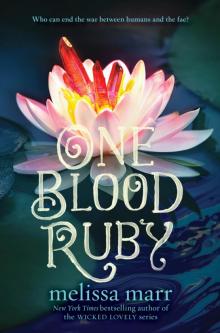 One Blood Ruby
One Blood Ruby Desert Tales
Desert Tales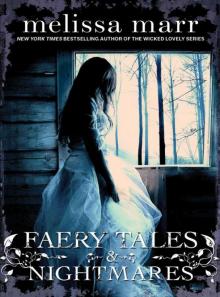 Faery Tales & Nightmares
Faery Tales & Nightmares Enthralled: Paranormal Diversions
Enthralled: Paranormal Diversions Wicked Lovely
Wicked Lovely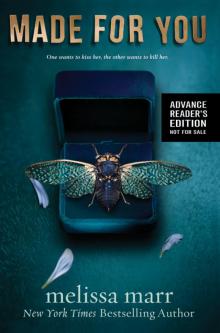 Made for You
Made for You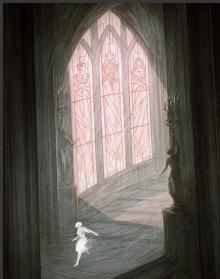 The Maiden Thief
The Maiden Thief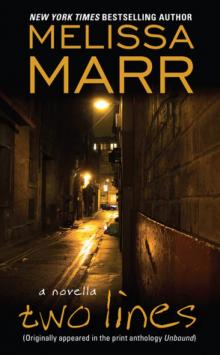 Two Lines
Two Lines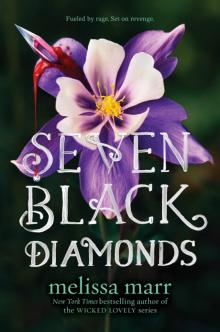 Seven Black Diamonds
Seven Black Diamonds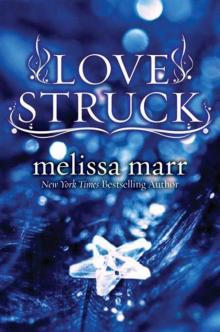 Love Struck
Love Struck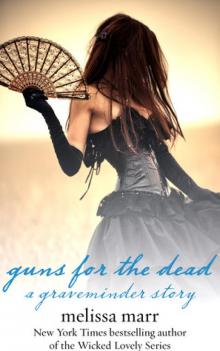 Guns for the Dead
Guns for the Dead Radiant Shadows
Radiant Shadows Ink Exchange
Ink Exchange Darkest Mercy
Darkest Mercy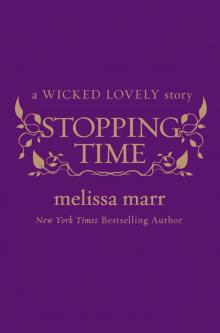 Stopping Time and Old Habits
Stopping Time and Old Habits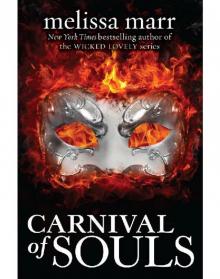 Carnival of Secrets
Carnival of Secrets Carnival of Lies
Carnival of Lies This Fond Madness
This Fond Madness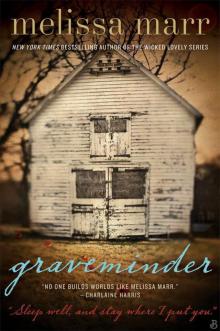 Graveminder
Graveminder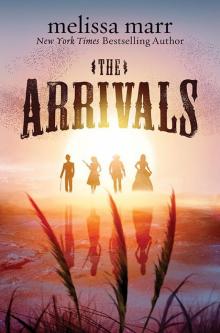 The Arrivals
The Arrivals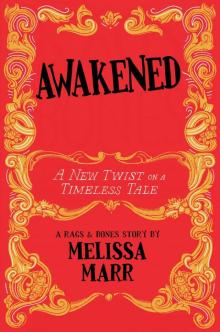 Awakened: A New Twist on a Timeless Tale
Awakened: A New Twist on a Timeless Tale Cold Iron Heart: A Wicked Lovely Novel
Cold Iron Heart: A Wicked Lovely Novel Summer Bound: A Wicked Lovely Story
Summer Bound: A Wicked Lovely Story The Wicked & The Dead (Faery Bargains Book 1)
The Wicked & The Dead (Faery Bargains Book 1)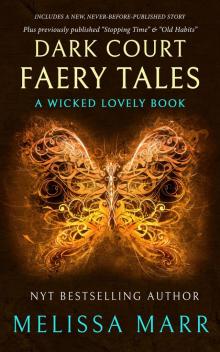 Dark Court Faery Tales
Dark Court Faery Tales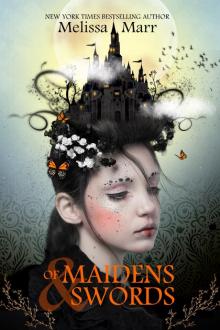 of Maidens & Swords
of Maidens & Swords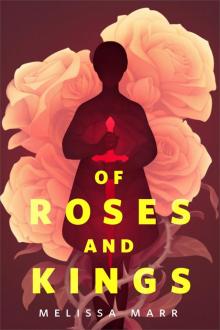 Of Roses and Kings
Of Roses and Kings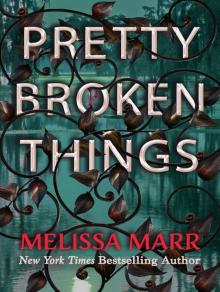 Pretty Broken Things
Pretty Broken Things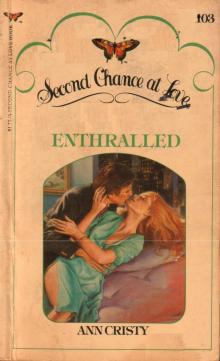 Enthralled
Enthralled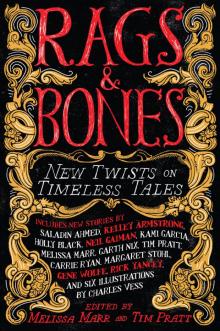 Rags & Bones
Rags & Bones Ink Exchange tf-2
Ink Exchange tf-2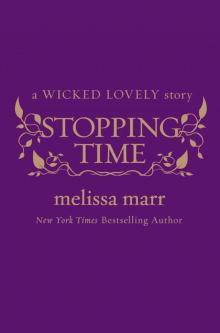 Stopping Time
Stopping Time Tales of Folk & Fey
Tales of Folk & Fey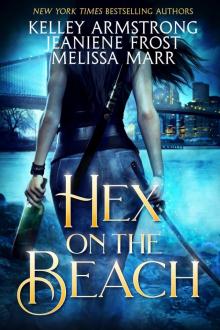 Hex on the Beach
Hex on the Beach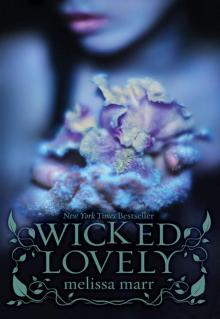 Wicked Lovely Free with Bonus Material
Wicked Lovely Free with Bonus Material Wicked Lovely tf-1
Wicked Lovely tf-1 Wicked Lovely with Bonus Material
Wicked Lovely with Bonus Material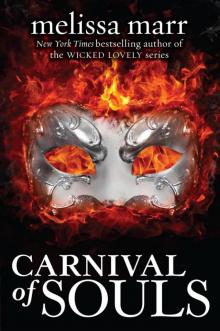 Carnival of Souls cos-1
Carnival of Souls cos-1 Radiant Shadows tf-4
Radiant Shadows tf-4 Darkest Mercy tf-5
Darkest Mercy tf-5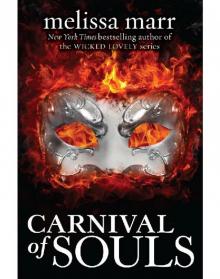 Carnival of Souls
Carnival of Souls Desert Tales: A Wicked Lovely Companion Novel
Desert Tales: A Wicked Lovely Companion Novel Fragile Eternity tf-3
Fragile Eternity tf-3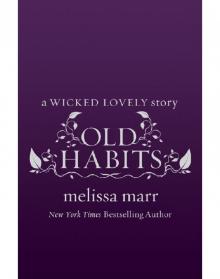 Old Habits
Old Habits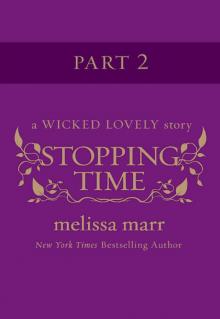 Stopping Time, Part 2
Stopping Time, Part 2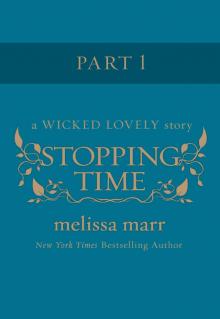 Stopping Time, Part 1
Stopping Time, Part 1